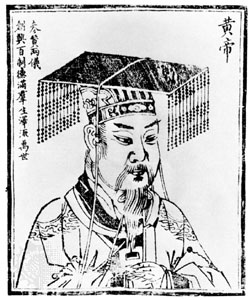Huangdi
Chinese mythological emperor
Wade-Giles Huang-ti (Chinese: “Yellow Emperor”), formally Xuanyuan Huangdi
 third of ancient China's mythological emperors, a culture hero and patron saint of Daoism.
third of ancient China's mythological emperors, a culture hero and patron saint of Daoism.Huangdi is reputed to have been born about 2704 BC and to have begun his rule as emperor in 2697. His legendary reign is credited with the introduction of wooden houses, carts, boats, the bow and arrow, and writing. Huangdi himself is credited with defeating “barbarians” in a great battle somewhere in what is now Shanxi—the victory winning him the leadership of tribes throughout the Huang He (Yellow River) plain. Some traditions also credit him with the introduction of governmental institutions and the use of coined money. Huangdi's wife was reputed to have discovered sericulture (silk production) and to have taught women how to breed silkworms and weave fabrics of silk.
Huangdi is held up in some ancient sources as a paragon of wisdom whose reign was a golden age. He is said to have dreamed of an ideal kingdom whose tranquil inhabitants lived in harmonious accord with the natural law and possessed virtues remarkably like those espoused by early Daoism. On waking from his dream, Huangdi sought to inculcate these virtues in his own kingdom, to ensure order and prosperity among the inhabitants. Upon his death he was said to have become an immortal.
- Sir Daniel, 1st Baronet Gooch
- Sir Daniel Gooch, 1st Baronet
- Sir D'Arcy Wentworth Thompson
- Sir David Attenborough
- Sir David Brewster
- Sir David Gill
- Sir David Hare
- Sir David Lean
- Sir David Low
- Sir David Lyndsay
- Sir David Macpherson
- Sir David Ross
- Sir David Stirling
- Sir David Wilkie
- Sir Dawda Kairaba Jawara
- Sir Denis Hamilton
- Sir Dennis Holme Robertson
- Sir Derek H.R. Barton
- Sir Derek Jacobi
- Sir Desmond MacCarthy
- Sir Dominic John, Baronet Corrigan
- Sir Dominic John Corrigan, Baronet
- Sir Donald Coleman Bailey
- Sir Donald Currie
- Sir Donald Francis Tovey